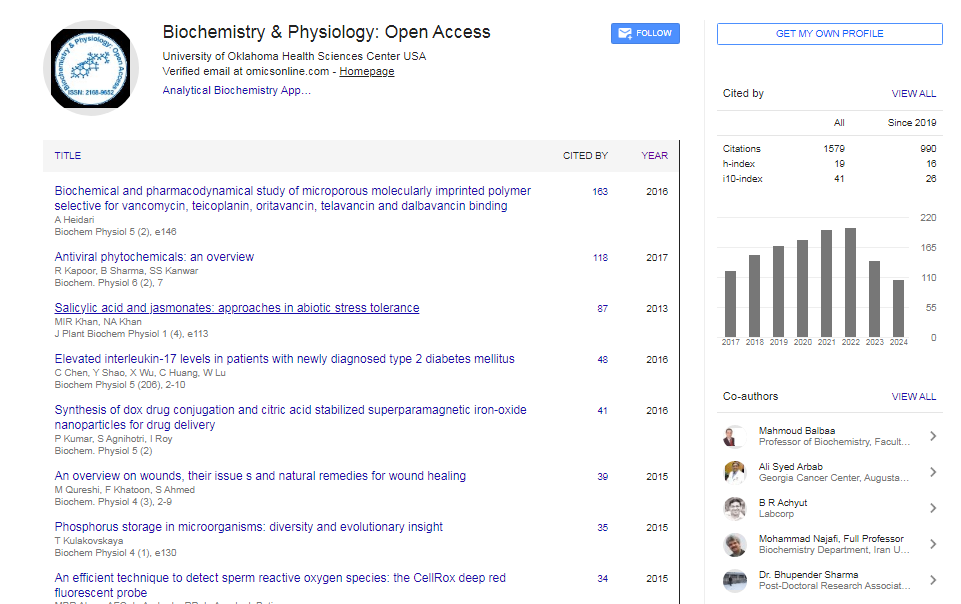Our Group organises 3000+ Global Conferenceseries Events every year across USA, Europe & Asia with support from 1000 more scientific Societies and Publishes 700+ Open Access Journals which contains over 50000 eminent personalities, reputed scientists as editorial board members.
Open Access Journals gaining more Readers and Citations
700 Journals and 15,000,000 Readers Each Journal is getting 25,000+ Readers
Google Scholar citation report
Citations : 1579
Biochemistry & Physiology: Open Access received 1579 citations as per Google Scholar report
Indexed In
- CAS Source Index (CASSI)
- Index Copernicus
- Google Scholar
- Sherpa Romeo
- Open J Gate
- Genamics JournalSeek
- Academic Keys
- JournalTOCs
- Ulrich's Periodicals Directory
- Electronic Journals Library
- RefSeek
- Directory of Research Journal Indexing (DRJI)
- Hamdard University
- EBSCO A-Z
- OCLC- WorldCat
- Scholarsteer
- SWB online catalog
- Virtual Library of Biology (vifabio)
- Publons
- Euro Pub
- ICMJE
Useful Links
Recommended Journals
Related Subjects
Share This Page
Padmanava Dash

Padmanava Dash
Department of Biology and the Environmental Science
Biography
Dash’s research interests includes water quality, Harmful Algal Blooms (HABs) and phytoplankton ecology, toxic metals, harmful microorganisms, remote sensing, limnology, biological and physical oceanography, and coastal and oceanic biogeochemical processes. HABs are caused by species of tiny plants, phytoplankton. HABs may cause harm through the production of potent chemical toxins or by their accumulated biomass. Due to the human health threats and their negative impact on aquatic life, recreation and tourism, HABs have significant economic and sociocultural impacts worldwide. Additionally, the freshwater systems are affected by eutrophication, leading to undesirable increases in harmful microorganisms (pathogens) and toxic metals. Dash’s current research interest includes field, laboratory and satellite remote sensing research to study various HAB forming species to enhance the current state of knowledge on detection and mapping of the HABs and thus support state and coastal community efforts to manage human health and fisheries in the region.
Research Interest
Coastal and Estuarine Ecology, Limnology, Environmental Toxicology, Remote Sensing, Harmful Algal Blooms, Biological Oceanography, Water Quality, Biological and Physical Oceanography and Coastal & Oceanic Biogeochemical processes.

 Spanish
Spanish  Chinese
Chinese  Russian
Russian  German
German  French
French  Japanese
Japanese  Portuguese
Portuguese  Hindi
Hindi 